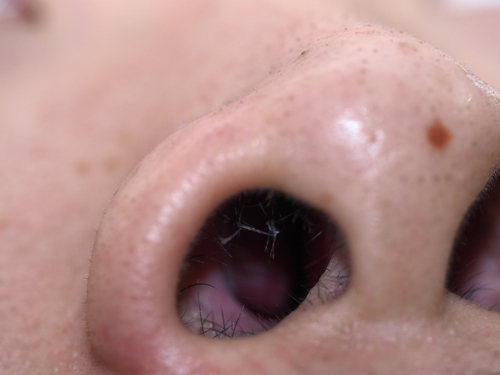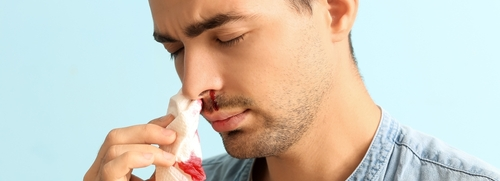Studies have found an interesting link between nosebleeds and chronic alcohol abuse, commonly known as “alcoholics’ nose.” A bloody nose after drinking can be a scary experience but doesn’t always signal an emergency. However, it could be a sign of chronic alcohol abuse. Here’s everything you need to know about nosebleeds caused by alcohol abuse.
Key points of this article:
- Alcohol acts as a blood thinner, damages blood vessels, and can lead to dehydration.
- Nosebleeds aren’t typically dangerous, but can become serious if they’re extensive or frequently occur.
- Frequent nosebleeds after drinking alcohol is a sign of alcohol abuse.
- If you are struggling with alcohol abuse, help is available. East Coast Recovery offers comprehensive alcohol addiction treatment programs.
How Can Alcohol Abuse Cause Nosebleeds?
There are three main reasons why someone might have a bloody nose after drinking alcohol: platelet damage, blood vessel damage, dehydration, and hemorrhaging due to a medical emergency.
#1 Damaged Platelets
Alcohol has an immediate negative effect on platelets in blood, small colorful fragments responsible for clotting. Alcohol acts as a blood thinner. Researchers compare alcohol’s blood-thinning effects to aspirin. Unfortunately, alcohol’s blood-thinning effect on platelets can have much more serious implications than just a bloody nose.
Chronic alcohol abusers are more susceptible to heavy bleeding and bruising if they are injured while intoxicated. Alcohol’s effects on coordination and vision can make a person more likely to be injured. It’s also known that alcohol impairs judgment and decision-making skills. As a person’s blood-alcohol concentration rises, they begin to experience:
- Inability to perform two tasks at once
- Altered mood
- Reduced ability to track moving objects
- Slower response to emergencies
- Reduced ability to concentrate
- Euphoric, relaxed mood
- Impaired perception and self-control
- Deterioration of reaction time
- Loss of auditory processing
- Major loss of balance
In addition to serious injuries and bleeding, alcohol’s effect on the blood can compromise your overall cardiovascular health and increase the risk for serious and fatal cardiovascular conditions, including high blood pressure, cardiomyopathy, hypertension, coronary heart disease, heart attack, and stroke.
Read more: Why Is My Loved One Hiding Alcohol? Signs & Causes

#2 Damaged Blood Vessels
Alcohol has an enlarging effect on the superficial blood vessels within the nasal cavity. When a person is consuming alcohol, the skin lining the inside of the nasal cavity is more vulnerable to injury and bleeding. Accidentally scraping the inside of the nose with a fingernail could cause a severe nosebleed if you have been drinking. Intoxicated individuals are more likely to have a bad nosebleed after injuring their face.
#3 Dehydration
As a diuretic, alcohol removes fluids from the blood via the kidneys and bladder at a much quicker rate compared to water, juice, and other beverages. Failing to drink adequate water while consuming alcohol can quickly lead to dehydration. This can lead to visible changes in the look and texture of skin. Dehydration can lead to dry nasal passages, blood thinning, weakened blood vessels, and nasal congestion, leading to irritation and nasal sensitivity.
Connect With Us Now
Reach out to East Coast Recovery now for immediate support, or let us know the best time to contact you through our confidential callback service. Your journey to healing is just a conversation away.
When Are Nosebleeds Dangerous?
In most cases, the relationship between alcohol and bloody nose is superficial and doesn’t require urgent medical care. However, someone struggling with excessive alcohol use shouldn’t dismiss a bloody nose. One article reported an instance of a death due to a severe nosebleed that was related to alcohol use.
The amount of blood being lost during a nosebleed can tell you a lot about the severity of the situation. If a nosebleed only gets a few tissues wet before stopping, this generally indicates that a person has experienced a mild issue. The situation is very different if the volume of the nosebleed can fill a cup. If that happens to you, seek immediate medical treatment. Here are some other guidelines for dangerous nosebleeds:
Bleeding occurs longer than 15 to 20 min after applying direct pressure to the nose.
You are having difficulty breathing.
The nosebleed is accompanied by vomiting caused by swallowing a large quantity of blood.
Blood is accompanied by concerning mucus or pus.
Nosebleeds that begin in the back of the nose (posterior) can be more dangerous than typical nosebleeds that start in the nasal cavity. Posterior nosebleeds are dangerous and involve large blood vessels. If a nosebleed has occurred following any type of accident or blow to the head, it could be a sign of internal bleeding and hemorrhaging.
Read more: Can Alcoholics Ever Drink Again?

Take Our Addiction Quiz For Recovery Insights
Nosebleeds Can Be A Sign Of Alcohol Abuse
Drinking alcohol to the extent of frequent bloody noses is a sign of substance abuse. Alcohol abuse treatment covers the emotional, psychological, behavioral, and physical aspects of addiction. There are a variety of treatment options available to help individuals overcome alcohol addiction, including at East Coast Recovery. Here are some example of what to expect in an alcohol addiction treatment program:
Medical alcohol detox: If you’re at the stage where drinking is severe enough to induce nosebleeds, treatment often begins with medically assisted detox. This provides a safe, controlled, and comfortable setting where an individual can withdraw from alcohol under the supervision of trained medical professionals. Other aspects of treatment for alcohol addiction can include:
Cognitive-Behavioral Therapy (CBT): CBT is one of the most popular therapies for addressing addictive behaviors. Using CBT, individuals can learn how to counter the responses and behaviors they default to when they feel uncomfortable or stressed. They can then substitute harmful and dangerous behaviors for positive responses.
Trauma Therapy: By working with trauma-informed therapists and medical professionals, individuals can learn to recognize the connection between their past experiences and alcohol consumption.
Interpersonal Therapy: Using social networks and support structures, interpersonal therapy can help a person to moderate depression, loneliness, and other drivers of addictive and self-sabotaging behaviors.
Experiential and Holistic Therapies: While many people appreciate the science-backed principles of medically supervised detoxes and traditional therapies, they also hunger for treatments that fit into their spiritual and artistic sides. Holistic and nontraditional therapies can include meditation, yoga, animal therapy, wilderness therapy, art, music, adventure therapy, and more.
Nosebleeds are more common than you think. While it’s far from the only symptom of excessive drinking, it can be one of the most alarming. Nosebleeds are also visual reminders of the negative effects that consuming excessive amounts of alcohol can have on blood, circulation, and the cardiovascular system.
Are You Covered For Treatment?
East Coast Recovery Center partners with numerous private insurance providers. Our team is committed to assisting you in quickly and effortlessly verifying your insurance coverage for treatment.
Alcohol Abuse Treatment Near Boston, MA
If you or someone you know is struggling with alcohol abuse or you’re noticing frequent nosebleeds after drinking, contact East Coast Recovery Center. Our clinicians can find out if alcohol abuse is causing nosebleeds and help you heal and recover through our comprehensive treatment programs. We offer everything an individual needs to overcome addiction, including full and half-day treatment. We also offer medication-assisted treatment, holistic therapies, aftercare programs, and more. Call, email, or fill out a form today to get started.










